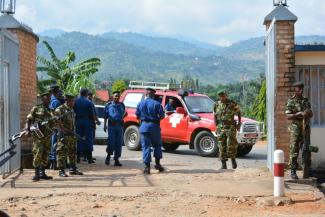Comment
Disintegrating state

Burundian soldiers and police officers have been deserting in growing numbers since a coup attempt failed in May 2015. Those who served in the regular, Tutsi-dominated Burundian army (Forces armées burundaises – FAB) during the civil war of 1993 to 2005 now fear abduction and extra-judicially killing. At the same time, many Burundian soldiers do not return home after taking part in international peace missions abroad.
The crisis set in when Pierre Nkurunziza, the incumbent president, declared in April 2015 that he would run for a third term. Some military leaders responded by trying to topple him. Their coup failed. According to the UN Human Rights Commission, more than 1000 people have since been killed, and more than 4000 were detained or kidnapped. According to Human Rights Watch, many of the people concerned were murdered by the security forces.
After having safeguarded stability in Burundi for a decade, the peace agreement that was signed in Arusha in 2000 no longer seems to be in force. Nkurunziza’s announcement that he would run for office again breached it and Burundi’s constitution. Other peace-agreement provisions, which affect the security forces and are meant to prevent coups and genocidal action, are being neglected as well.
As the non-governmental International Crisis Group (ICG) bemoans, the army is split today in spite of the Arusha peace agreement having been one of the major achievements of its kind in history. Soldiers and police offers who previously served the FAB are recurrently killed by comrades-in-arms who previously fought for the Hutu-led rebel movement “Partis et Mouvements Politiques Armés (PMPA).
Thiery Vercoulon of the ICG emphasises that Paragraph 14 of the Arusha agreement is being violated. It states that no ethnic group may have more than a 50 % representation in the national military. Nkurunziza never accepted this quota. In his eyes, it is unacceptable that the Tutsi, who are the smaller community, should man half of the security forces. Accordingly, there are hardly any former FAB officers among the army’s top brass – except a very few who have switched sides. The Arusha agreement has been breached in other ways too. For example, young supporters of the CNDD-FDD, the ruling party, are now serving in the military, as are members of the Hutu-led FDLR militia that bears considerable responsibility for the Rwandan genocide of 1994.
For more than one year, no one has been safe from violence anymore. In the wake of the failed coup, two rebel movements have emerged. They are challenging Nkurunziza’s power. The Forces Républicaines du Burundi (FOREBU) are mostly based on deserted soldiers, whereas the Résistance pour un Etat de droit au Burundi (RED Tabara) mostly relies on the youth opposition movement. Both organisations have declared their willingness to resort to violence. Nkurunziza, on the other hand, has indicated his intention to repress the rebels. Whenever a high-ranking military officer who is close to Nkurunziza is killed, former FAB fighters get killed in revenge.
In view of human-rights infringements and the lack of ethnic balance, a check needs to be put on the security forces. That is difficult in the current circumstances however. Talks between the government and the opposition are officially being held, but Nkurunziza’s stance looks insincere since he is calling members of the opposition terrorists and coup supporters. International organisations, led by the UN, want the Arusha peace agreement to be upheld. The problem is that it has failed. For Burundi to rebuild democratic institutions, a new agreement of this kind is needed.
Marc Niyonkuru is a free-lance journalist from Burundi and is currently based in Rwanda.
nimarc35@gmail.com







